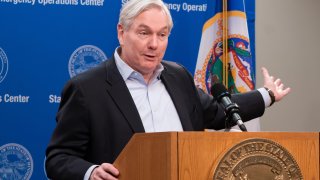
- Dr. Michael Osterholm, a coronavirus advisor to President-elect Joe Biden, said a nationwide lockdown would help bring the virus under control in the U.S.
- He said the government could borrow enough money to pay for a package that would cover lost income for individuals and governments during a shutdown.
- "We could really watch ourselves cruising into the vaccine availability in the first and second quarter of next year while bringing back the economy long before that," he said.
Shutting down businesses and paying people for lost wages for four to six weeks could help keep the coronavirus pandemic in check and get the economy on track until a vaccine is approved and distributed, said Dr. Michael Osterholm, a coronavirus advisor to President-elect Joe Biden.
Osterholm, who serves as director of the Center of Infectious Disease Research and Policy at the University of Minnesota, said earlier this week that the country is headed toward "COVID hell." Cases are rising as more people grow tired of wearing masks and social distancing, suffering from so-called "pandemic fatigue," he said Wednesday. Colder weather is also driving people indoors where the virus can spread more easily.
A nationwide lockdown would drive the number of new cases and hospitalizations down to manageable levels while the world awaits a vaccine, he told Yahoo Finance on Wednesday.
"We could pay for a package right now to cover all of the wages, lost wages for individual workers for losses to small companies to medium-sized companies or city, state, county governments. We could do all of that," he said. "If we did that, then we could lockdown for four-to-six weeks."
He referenced an August op-ed he wrote with Minneapolis Federal Reserve President Neel Kashkari in which the two argued for more restrictive and uniform lockdowns across the nation.
"The problem with the March-to-May lockdown was that it was not uniformly stringent across the country. For example, Minnesota deemed 78 percent of its workers essential," they wrote in the New York Times. "To be effective, the lockdown has to be as comprehensive and strict as possible."
Coronavirus Pandemic
Full coverage of the COVID-19 outbreak and how it impacts you
On Wednesday, Osterholm said such a lockdown would help the country bring the virus under control, "like they did in New Zealand and Australia." Epidemiologists have repeatedly pointed to New Zealand, Australia and other parts of Asia that have brought the number of daily new cases to under 10 as an example of how to contain the virus.
"We could really watch ourselves cruising into the vaccine availability in the first and second quarter of next year while bringing back the economy long before that," he said Wednesday.
On the current trajectory, Osterholm said the U.S. is headed for dark days before a vaccine becomes available. He said health-care systems across the country are already overwhelmed in places like El Paso, Texas, where local officials have already closed businesses and the federal government is sending resources to handle a surge in deaths caused by COVID-19.
Osterholm said the country needs leadership. The president-elect is up to the task of providing that leadership, Osterholm said, adding that it could also come from local and state officials or those in the medical community. He referenced the fireside chats broadcast over radio during former President Franklin D. Roosevelt's terms, through which Roosevelt addressed the country on issues ranging from the Great Depression to World War II.
"People don't want to hear that El Paso isn't an isolated event. El Paso, in many instances, will become the norm," he said. "I think that the message is how do we get through this. We need FDR moments right now. we need fireside chats. We need somebody to tell America, 'this is what in the hell is going to happen.'"


